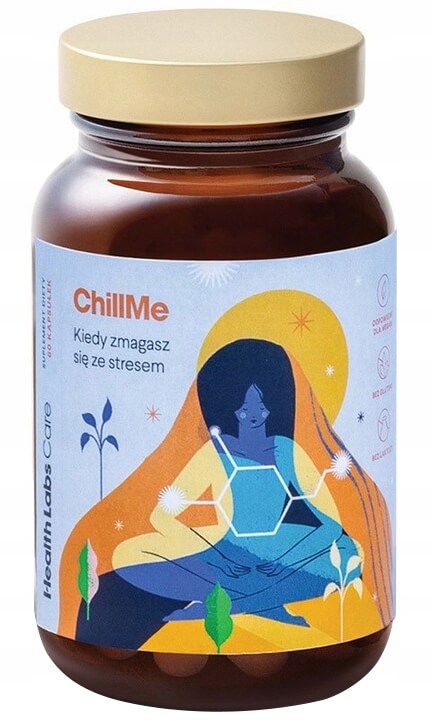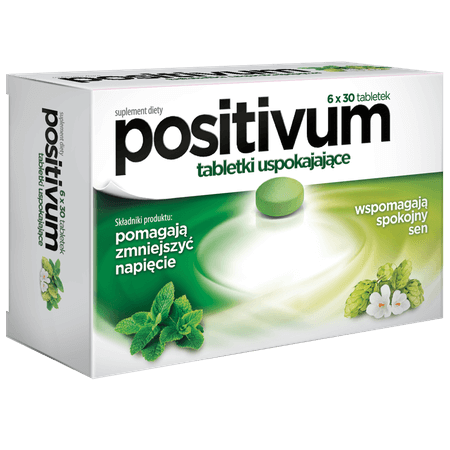Calming tablets: what to choose? The 12 best products and expert advice
Find out what calming remedies experts recommend and how to better manage stress.


Learn more about our editorial process
.

Learn more about our editorial process
.

Learn more about our editorial process
.

Learn more about our editorial process
.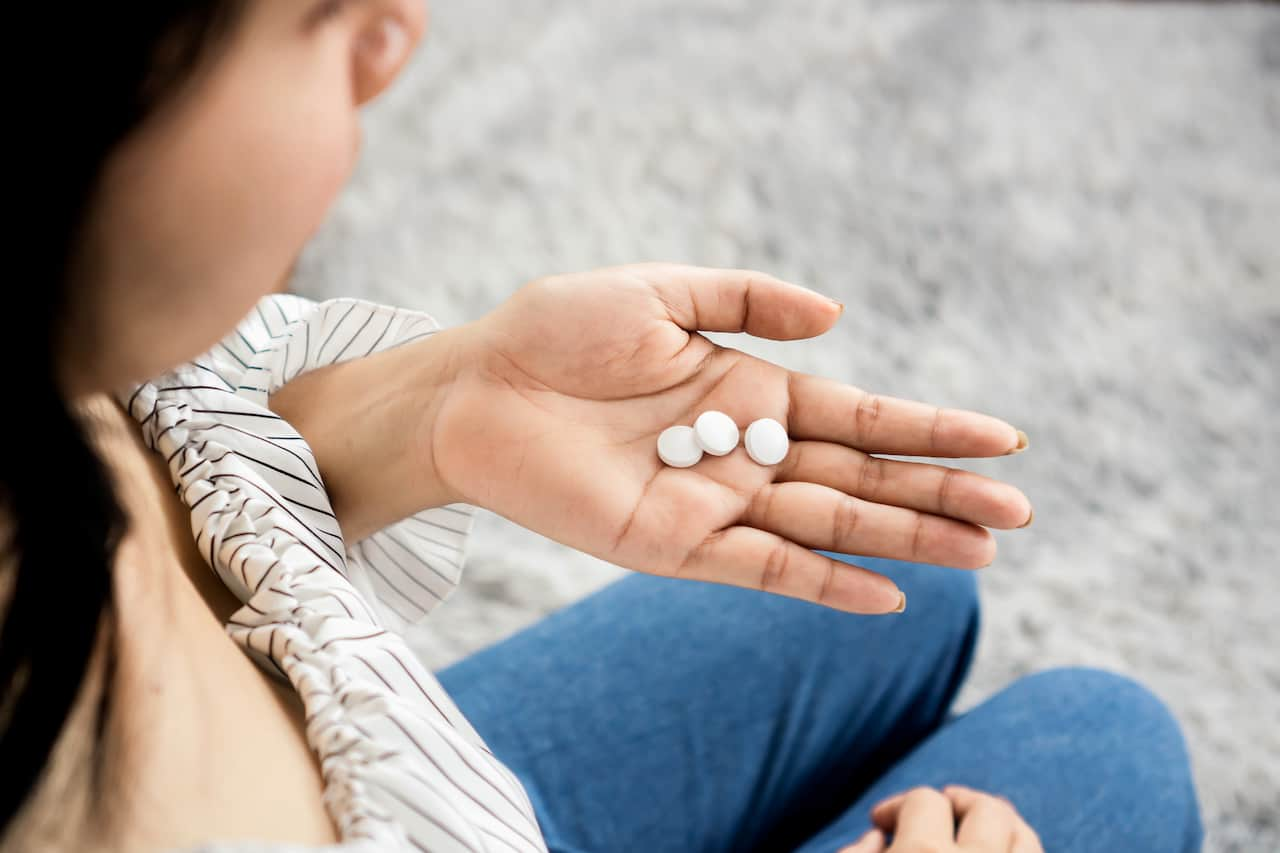
Why you can trust us
Articles on Natu.Care are written based on scientific research, data from government websites and other reliable sources. The texts are written in cooperation with doctors, nutritionists and other health and beauty experts. Articles are reviewed before publication and during significant updates.
.Learn more about our editorial process
.Information about advertisements
Content on Natu.Care may contain links to products from the sale of which we may receive a commission. When creating content, we adhere to high editorial standards and take care to be objective about the products discussed. The presence of affiliate links is not dictated by our partners, and we select the products we review ourselves completely independently.
.Learn more about our terms and Conditions
.Life in a constant state of flux, pressure at work, an uncertain tomorrow, anxiety about loved ones - all this makes us lose ourselves and forget about our health. Long-term stress and tension often push us to the limits of our physical and mental endurance. In such situations, the first instinct is often to reach for a tranquilliser tablet. But do you do this consciously? Do you know which product will work best for you?"
With Anna Szymanska, Master of Pharmacy, we have prepared for you an overview of popular tranquilliser tablets divided into medicinal products and dietary supplements. In addition, together with psychologist Jagoda Turowska, we have created a small guide to help you recognise the most important symptoms of chronic stress and show you how you can deal with them.
From this article you will learn:
- What tranquilliser tablets are recommended by experts .
- What ingredients to look for in popular tranquilliser tablets .
- How drugs with benzodiazepines and hydroxyzine work .
- What symptoms chronic stress can give .
- How you can manage stress on your own, and when it's worth turning to a specialist .
See also:
- Adaptogens
- Mental health in times of depressed mood
- How to take care of your health
- Ashwagandha Naturell
- Ashwagandha Solgar
- Ashwagandha Aliness
- Ashwagandha SFD
Best tranquilliser tablets: product ranking
.
In our list you will find popular over-the-counter medicines and dietary supplements available on the market. The most important selection criteria were, above all, the documented effects of the individual active substances and the simplicity of the formulation.
Dietary supplements for sedation
.
Compared to medicinal products, supplements are more varied in terms of their composition. In addition, they may not contain titanium dioxide. This is a big plus for people who pay special attention to unnecessary 'fillers'. Work is currently underway to make it disappear from medicines as well - but it is not known when exactly this will happen.
Sedative supplements are intended for people whose conditions do not require treatment and in whom dietary enrichment is sufficient. In most cases, the effects of use occur after prolonged use - from several days to several weeks..
 .
.
Anna Szymanskamagister of pharmacy
.Natu.Care Premium Magnesium + Vitamin B6
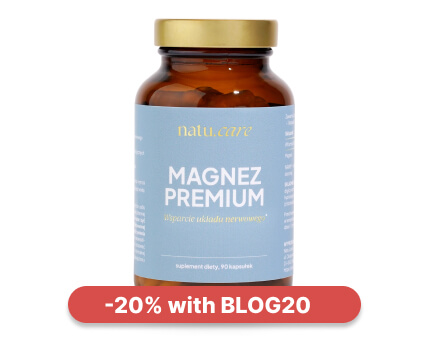
- Magnesium content per day: 305 mg
- Additional active ingredients: Vitamin B6 (2.1 mg)
- Form: capsules
- Serving size: 3 capsules per day
- Sufficient for: 30 days
Product description
The Premium Magnesium + Vitamin B6 dietary supplement is a comprehensive product that combines three organic forms of magnesium (citrate, malate, and diglycinate) and vitamin B6 in highly absorbable forms.
Magnesium is an essential mineral without which our bodies cannot function properly. It supports the immune, nervous, and muscular systems, maintains electrolyte balance, and is involved in cell division and the regulation of mental functions.
Research shows that magnesium supplementation is even more effective when accompanied by vitamin B6, which is included in our product. Vitamin B6 is responsible for the proper functioning of the nervous and immune systems, as well as the proper functioning of the heart.
If you want to safely get rid of feelings of fatigue, concentration problems, hair loss, muscle cramps, trembling, or irritability, reach for Premium Magnesium from Natu.Care, tested by the independent, certified laboratory J.S. Hamilton Poland.
Pros and cons
Pros
- Supports the proper functioning of the nervous and immune systems.
- Reduces feelings of fatigue and tiredness.
- Maintains proper psychological functions.
- The purity of the ingredients (free from anti-caking agents, artificial fillers, and additives such as titanium dioxide, microcrystalline cellulose, talc, magnesium stearate, and silicon dioxide) has been confirmed by laboratory tests.
- High absorption of ingredients.
- Soft capsules that are easy to swallow.
- Suitable for vegetarians and vegans.
Cons
- None.
Additional information
Take with a meal, 3 capsules per day.
The capsules should be taken with at least 250 ml of water.
If you have trouble sleeping, it is advisable to take 1 capsule in the morning and 2 capsules in the evening, no later than 4 hours before bedtime.
Avoid combining with products high in calcium (milk, yogurt, cheese), as this may negatively affect magnesium absorption.
Pregnant and breastfeeding women should consult a doctor before starting supplementation.
User review
I’m very impressed with the speed of delivery. The product itself is of high quality and absorbs well. After two weeks of supplementation, I’ve noticed a significant improvement in muscle recovery, especially during periods of intense training. I highly recommend it!
Sundose° Daily Glow°
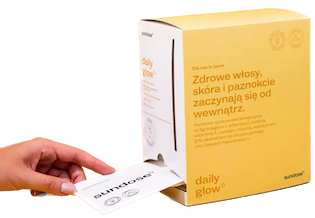
- Collagen content: 5000 mg collagen hydrolysate PEPTAN®
- Additional active ingredients: hyaluronic acid, coenzyme Q10, field horsetail extract, D-biotin, zinc, copper, vitamin A, vitamin C, manganese and omega-3 acids .
- Form: powder .
- Dose: one sachet + capsule
- Sufficient for: 30 days .
Product description
Daily Glow is a carefully composed formula based on PEPTAN® fish collagen and other valuable ingredients thatósupport the regeneration of dry skinóry, damaged hairów and brittle nails.
Pros and cons
Daily Glow is a carefully composed formula based on PEPTAN® fish collagen and other valuable ingredients thatósupport the regeneration of dry skinóry, damaged hairów and brittle nails.
Additional information
Daily Glow is a carefully composed formula based on PEPTAN® fish collagen and other valuable ingredients thatósupport the regeneration of dry skinóry, damaged hairów and brittle nails.
Daily Glow is a carefully composed formula based on PEPTAN® fish collagen and other valuable ingredients thatósupport the regeneration of dry skinóry, damaged hairów and brittle nails.
NeoMag Stress
Product description
Magnesium and vitamin B6 help to support the normal functioning of the nervous system and maintain normal psychological functions. Lemon balm herb extract helps to support good mood and normal cognitive function. Hops cone extract supports relaxation and physical and mental well-being. It also contributes to a restful and healthy sleep.
Pros and cons
Magnesium and vitamin B6 help to support the normal functioning of the nervous system and maintain normal psychological functions. Lemon balm herb extract helps to support good mood and normal cognitive function. Hops cone extract supports relaxation and physical and mental well-being. It also contributes to a restful and healthy sleep.
Additional information
Magnesium and vitamin B6 help to support the normal functioning of the nervous system and maintain normal psychological functions. Lemon balm herb extract helps to support good mood and normal cognitive function. Hops cone extract supports relaxation and physical and mental well-being. It also contributes to a restful and healthy sleep.
Expert opinion
ChillMe
Product description
ChillMe Health Labs Care is a multi-ingredient dietary supplement in capsule form, whichós formula has been developed for people with lifestyles that require focus and can lead to stressful situations. It combines four standardised herbal extracts from, amongst others, Asian basil leaves, green tea and witania spleen root.
Pros and cons
ChillMe Health Labs Care is a multi-ingredient dietary supplement in capsule form, whichós formula has been developed for people with lifestyles that require focus and can lead to stressful situations. It combines four standardised herbal extracts from, amongst others, Asian basil leaves, green tea and witania spleen root.
Additional information
ChillMe Health Labs Care is a multi-ingredient dietary supplement in capsule form, whichós formula has been developed for people with lifestyles that require focus and can lead to stressful situations. It combines four standardised herbal extracts from, amongst others, Asian basil leaves, green tea and witania spleen root.
Expert opinion
Positivum
Product description
Positivum is a dietary supplement which is a combination of natural ingredientsós derived from plants. The film-coated tablet formula will prove useful as a dietary supplement for adults.
Pros and cons
Positivum is a dietary supplement which is a combination of natural ingredientsós derived from plants. The film-coated tablet formula will prove useful as a dietary supplement for adults.
Additional information
Positivum is a dietary supplement which is a combination of natural ingredientsós derived from plants. The film-coated tablet formula will prove useful as a dietary supplement for adults.
Expert opinion
When using sedatives - both herbal and synthetic - refrain from driving and using machinery..
 .
.
Anna Szymanskamagister of pharmacy
..
Medicinal products for sedation
.
The efficacy of medicinal products is confirmed by clinical studies. Herbal medicines, to be registered as medicines, must contain substances that have been commonly used for medicinal purposes for at least 30 years. Each ingredient - both active and filler - has a documented origin and production process, which is a guarantee of safety for consumers.
The manufacture of medicines is also subject to strict procedures and is periodically monitored by the relevant authorities. All this is done in order to provide patients with the safest possible product, with a defined efficacy.
Before taking tranquilliser tablets, read the leaflet to avoid potential interactions, know the contraindications and be prepared for possible side effects.
 .
.
Anna Szymanskamagister of pharmacy
.. .
When to use tranquilliser tablets and which products can you use?
.
Sedative tablets provide support in situations of high stress, severe tension - including muscular tension - or in anxiety and neurotic conditions.
They have a calming and relaxing effect, help to return to emotional equilibrium, reduce feelings of anxiety, and combat sleep disorders.
There are two groups of such remedies available on the market - over-the-counter (OTC drugs and dietary supplements) and prescription (so-called RX drugs - their use is decided by a doctor).
Prescription-free sedative tablets and herbal preparations
.
Herbal tablets are usually taken by people who suffer from sleep problems, irritability or mood swings. Importantly, these products are not addictive and do not 'muddle up'.
What ingredients are found in natural tranquillisers?
.
The most popular and thoroughly researched ingredients in herbal tranquilliser tablets are primarily:
- Glover - specifically, the extract of its root, which contains a mixture of compounds (including isovaleric acid and valerenic acid) commonly known as valerian. These substances show activity towards the human nervous systemand. They have a calming effect and make it easier to fall asleep.
- Hops cone - hops cone extract has a calming and tranquilising effect, as well as facilitating falling asleep and prolonging sleepand. .
- Saffron - exhibits sedative and anti-anxiety effects .
- Melissa - research suggests that it has the best calming and tranquilising effects when combined with hops and valerianand. .
- St. John's Wort - recommended more for depressive states, however, due to the presence of biflavonoids it also shows relaxing and calming effects . .
It is also increasingly common to find the herb mint and ashwagandha, or Indian ginseng. In addition, you will find vitamins B6, B12 and magnesium in the formulation of tranquilisers, which support the proper functioning of the nervous system.
What else to look out for before buying?
.
Before choosing a particular formula, carefully review the composition and potential side effects.
The best products for sedation contain so-called standardised extracts, i.e. those that have a precisely defined value (amount and concentration) of active ingredients..
 .
.
Anna Szymanskamagister of pharmacy
..
If you have questions or doubts about the composition or action of the active substances - do not buy tranquillisers on your own. Consult your pharmacist or your healthcare provider for a decision.
.
Prescription sedation tablets
.
Among prescription medications, the most commonly used are those containing benzodiazepines or hydroxyzine.
Medicines with benzodiazepines
.
Indications for useand benzodiazepines are primarily:
- anxiety disorders, .
- insomnia, .
- acute status epilepticus, .
- spastic disorders, .
- seizure disorder, .
- severe agitation, .
Note!
.These should not be given in depressed statesand.
.
Clinically used since the 1960s, benzodiazepines affect the central nervous system . They modulate the GABAA receptor to increase the activity of GABA - which is the main inhibitory neurotransmitter in our brain.
An inhibitory neurotransmitter is a substance that can block the action of nerve conductors. The GABA transmitter regulates the control of many brain functions, including the centre responsible for experiencing anxiety. Increased GABA activity results in a slowing down of neurotransmission, and thus a sedative and anxiolytic effect.
Side effects
.
Benzodiazepines can also cause a number of side effects and adverse reactions.
The most common areand:
- respiratory depression, .
- respiratory arrest, .
- insomnia, .
- disorientation, .
- headache, .
- fainting, .
- nausea and vomiting, .
- diarrhoea, .
- fluttering of the extremities, .
Cardiac arrhythmias may also occur, as well as central nervous system and visual disturbances. Benzodiazepines are often abused (especially in combination with opioids and alcohol ) and should not be used long-term.
Medications with hydroxyzine
.
Hydroxyzine exhibits sedative and anti-anxiety effectsand. This is related to the inhibition of activity in the subcortical layer of the central nervous system. As a result, it reduces the state of internal tension, reduces feelings of anxiety, as well as anxiety and muscle tension.
Side effects
.
As with all drugs, hydroxyzine can also cause side effects and adverse reactions.
The most common areand:
- pain and discomfort in the chest, .
- accelerated heart rate, .
- spiration, .
- coughing, .
- fatigue and weakness, .
- problems swallowing,
- dullness and weakness,
- healing.
- chiness of the skin,
- rash.
- rash, .
Rarely reported side effects includeand:
- headaches, .
- dryness in the mouth, .
- visual and auditory flashes, .
Note!
.If you notice any side effects or adverse reactions in yourself while taking sedation medication, discontinue use immediately and consult your doctor.
Sedation tablets - contraindications
.
Although most products and active ingredients are safe - as long as they are used within dosage limits - not everyone can or should take tranquilliser tablets.
Most products and active ingredients are safe - as long as they are used within dosage limits.
Most important contraindications include:
.
- hypersensitivity to the active substances, .
- alcohol disease - some of the natural active substances are extracted using ethanol, .
- damage or chronic diseases related to major organs (brain, liver, kidneys, heart). .
What symptoms can chronic stress and nervous tension conditions produce?
.
Stress is a factor that unbalances the entire body and directly affects our physical and mental healthand. Living under constant tension can produce a variety of symptoms, both somatic and emotional. None of these should be underestimated. What symptoms should worry you? We asked psychologist, gr Jagoda Turowska, for the answer.
Physical symptoms that accompany chronic stress and tension include:
- shaking hands, .
- increased sweating, .
- accelerated heartbeat, .
- difficulty sleeping (insomnia or frequent awakenings during the night), .
- indigestion, .
- reduced libidoand, .
- disruption of the menstrual cycle, .
- dry mouth, .
- weakened immunity, .
- rapid weight gain and obesity due to retained cortisoland which leads to "overeating" stress and reduced energy expenditure, .
- nervous tics; .
- hair loss, .
- squeezing in the throat, .
- muscle pain and stiffness, .
The signs of living under long-term stress can also have a mental, emotional dimension. Most commonly, you may experience conditions such as:
- a flurry of negative thoughts, .
- panic attacks, .
- indifference, depression and apathy, .
- difficulties with decision-making,
- pessimism and anxiety,
- pessimism and anxiety.
- feelings of loneliness and isolation, .
- anxiety, .
- anxiety, .
- irritation and irritability, .
- difficulties concentrating, .
- problems with memory, .
The negative impact of stress on your daily life will also be evidenced by the following behaviours:
.
- sleeping problems (trouble falling asleep, waking up prematurely, sleeping too long, insomnia), .
- isolation and avoidance of social contact - including with friends and immediate family, .
- proneness to impulsive, unpredictable actions, .
- frequent job changes, .
- inability to relax, .
- reduction of rest and leisure activities, .
- tics and nervous behaviours (e.g. nail biting), .
- compulsive eating and abuse of fat and sugar, .
- abuse of alcohol, drugs or sleeping pills, .
Stress and tension - what can you do on your own, and when to turn to a specialist?
.
We can deal with stress in many ways, adopting different strategies. It will always be a dynamic process that responds to specific situationsand. Psychologist, Jagoda Turowska, details a dozen suggestions that cover different aspects of our lives:
- .
- appropriate sleep hygieneand, .
- physical activity - a favourite sport or a simple walk to start with (it's just supposed to make you happy), .
- relaxation training - for example, Schultz autogenic training , Jacobson training , breathing training (slow inhalation through the nose [about 10 seconds], a second of stopping and slow exhalation through the mouth [about 10 seconds]), .
- relaxation exercises, .
- yogaand, .
- meditation and mindfulness training , .
- keeping a diary, .
- doing favourite activities and hobbies, .
- distracting thoughts from the stressor, .
- conversation with loved ones about emotions, .
- music therapyand, .
- appropriate diet and supplementation .
Think also about aromatherapy. Preliminary research suggests it can have positive effects. As one study suggests, you can (and should) combine aromatherapy with massage and reflexology.
Check also:
Unfortunately, we are not always able to manage everything. In such cases, it will be necessary to seek the help of a specialist - a psychologist or psychiatrist. Jagoda Turowska points out the most alarming symptoms and conditions that should prompt you to do so:
- apathy and sadness, .
- lack of energy to live, .
- permanent physical fatigue, .
- insomnia, .
- extremely pessimistic view of the future, .
- feeling of guilt, .
- insanity, .
- panic attacks, .
Treat the causes, not the symptoms!
.
If you observe these symptoms in yourself and know that they have been persisting for some time, don't delay - seek the help of a qualified professional who can make a diagnosis and offer appropriate solutions.
Experiencing anxiety involves feeling a lot of discomfort, which is unpleasant and we want to get rid of it as soon as possible. Medications can be helpful. They act on a temporary basis and quickly have the desired effect. They may bring temporary relief, but in the long term they will not overcome the source of the situation. To fully regain peace of mind, free yourself from anxiety and learn to deal effectively with your problems, it is worth working through them in psychotherapy..
 .
.
Malgorzata Kaczmarekpsychotherapist and psychologist
.
Before such a visit, have a check-up to help identify the causes more quickly and apply effective treatment!"
Mental balance also depends on the state of our health. See how Omega acids support them:
- Omega acids - what they are, types, properties, deficiency .
- Omega-3 fatty acids - characteristics, effects, use, types .
- DHA acid - what it is, health properties, sources .
Every one of us lives a stressful life. However, it can be made a little easier. Changes to your daily routine, tranquillisers and support from a specialist can help - don't be afraid to ask for it when you're finding it hard to cope with everything.
Summary
.
Remember:
- There are many preparations for sedation available on the market: prescription and over-the-counter medicines, as well as dietary supplements.
- Many of the active substances are of natural origin. .
- The most common ingredients in herbal pills for sedation are valerian, lemon balm, hops cone, lemon balm or St. John's wort.
- The most common ingredients in herbal pills for sedation are valerian, lemon balm, lemon balm or St. John's wort.
- Living with chronic stress can cause physical, emotional, mental as well as behavioural symptoms. .
- If you see distressing symptoms in yourself that persist over a long period of time and you cannot cope with them, seek help from a specialist. The sooner you diagnose the problem, the sooner you can restore life's balance.
FAQ
.What helps with stress and nerves?
.To get rid of stress, and in order to relax your body and mind, ensure proper sleep hygiene and physical activity. Relaxation training (such as Schultz autogenic training, Jacobson training or breathing training), as well as meditation, yoga and mindfulness training will also help. And don't forget your favourite hobby, music therapy and diet and supplementation. You can also reach for mild calming products.
Are there tranquilliser tablets that do not stupefy?
Yes. In this case, calming and nerve-soothing preparations based on natural plant extracts and extracts, such as valerian, hops cones, lemon balm or mint, are best. Also hugely popular are ashwagandha and CBD oils, on which there is initial research, as well as anecdotal positive feedback from users.
Do tranquilliser tablets lower blood pressure?
.Because of their properties, sedatives indirectly have an effect on blood pressure. In people living under permanent stress and tension, the blood circulates faster. Due to their effect, tranquilliser tablets cause the blood to "slow down" and the pressure to fall. However, they should not be used to treat hypertension.
What calms but does not put you to sleep?
.For mild anxiety and nervous tension, herbs to brew will work well, as will herbal over-the-counter sedative tablets. Look especially for valerian (which contains valerian), lemon balm, hops cones or passionflower and ashwagandha in the formulations of such preparations. CBD oils are also gaining popularity.
Can I drive a car after taking tranquilliser tablets?
.No matter whether you have been taking herbal preparations or synthetic products - it is not recommended to drive after all sedatives. Although everyone reacts to specific preparations individually, there is always a high risk of reduced concentration, reduced reaction speed or an increase in feelings of drowsiness.
See the following.
Before taking, check the manufacturer's recommendations on the leaflet and follow your doctor or pharmacist's instructions.
Is it OK to take tranquilliser tablets during pregnancy and breastfeeding?
.Many prescription sedation drugs (including benzodiazepines and barbiturates) cross the placenta and can cause birth defects in the baby. They also pass into breast milk and can cause nervous system abnormalities, including neonatal withdrawal syndrome. Therefore, it is not advisable to use them during pregnancy and breastfeeding.
There is insufficient data at this time to indicate the safety of herbal tranquilliser tablets for use by pregnant and breastfeeding women.
Remember that during pregnancy and breastfeeding, the use of any medication or dietary supplement should be consulted with a healthcare practitioner.
Is there an over-the-counter substitute for hydroxyzine?
.Currently, all hydroxyzine-based medicines - whether in tablet or syrup form - regardless of dosage, are only available by prescription. In Poland, it can only be prescribed by the attending physician, who selects the appropriate dose on the basis of a detailed history. Any modification - whether for side effects or for lack of effect - should be determined after consultation with the doctor.
.
Resources
.See all
.de Witte, M., Pinho, A. da S., Stams, G.-J., Moonen, X., Bos, A. E. R., & van Hooren, S. (2022). Music therapy for stress reduction: A systematic review and meta-analysis. Health Psychology Review, 16(1), 134-159. https://doi.org/10.1080/17437199.2020.1846580
Grossman, P., Niemann, L., Schmidt, S., & Walach, H. (2004). Mindfulness-based stress reduction and health benefits: A meta-analysis. Journal of Psychosomatic Research, 57(1), 35-43. https://doi.org/10.1016/S0022-3999(03)00573-7
Hydroxyzine: MedlinePlus Drug Information. (n.d.). Retrieved March 16, 2023, from https://medlineplus.gov/druginfo/meds/a682866.html
Hydroxyzine (Oral Route) Side Effects-Mayo Clinic. (n.d.). Retrieved March 16, 2023, from https://www.mayoclinic.org/drugs-supplements/hydroxyzine-oral-route/side-effects/drg-20311434?p=1
Linde, K. (2009). St. John’s Wort – an Overview. Forschende Komplementärmedizin / Research in Complementary Medicine, 16(3), 1-1. https://doi.org/10.1159/000209290
Lunde, I. (1986). Antihistamines. IN M. N. G. Dukes & L. Beeley (Eds.), Side Effects of Drugs Annual (Vol. 10, pp. 135-136). Elsevier. https://doi.org/10.1016/S0378-6080(86)80021-6
Maust, D. T., Lin, L. A., & Blow, F. C. (2019). Benzodiazepine Use and Misuse Among Adults in the United States. Psychiatric Services, 70(2), 97-106. https://doi.org/10.1176/appi.ps.201800321
Miller, N. (2019, August 19). Autogenic training exercise. Counselling & Psychological Services. https://services.unimelb.edu.au/counsel/resources/guided-exercises/autogenic-training
Mushtaq, B. (2018). Jacobson Muscle Relaxation Technique (Jpmr) (20 Min). JOJ Nursing & Health Care, 8(1). https://doi.org/10.19080/JOJNHC.2017.08.555726
Navarro, F. H. (n.d.). Diet, Exercise, Mindfulness, and Relaxation: Stress Management and Stress Reduction. https://www.researchgate.net/publication/235746619
Nielsen, S. (2017). Benzodiazepines. Current Topics in Behavioral Neurosciences, 34, 141-159. https://doi.org/10.1007/7854_2015_425
Park, C. L., Finkelstein-Fox, L., Sacco, S. J., Braun, T. D., & Lazar, S. (2021). How does yoga reduce stress? A clinical trial testing psychological mechanisms. Stress and Health, 37(1), 116-126. https://doi.org/10.1002/smi.2977
Putowski, M., Podgórniak, M., Padała, O., Zawiślak, J., & Piróg, M. (2014). Stress and its negative effects on human reproduction. http://www.medical-technologies.eu/upload/03_stres_i_jego_negatywny_wplyw_na_rozrodczosc_czlowieka_-_putowski.pdf
Schiller, H., Forster, A., Vonhoff, C., Hegger, M., Biller, A., & Winterhoff, H. (2006). Sedating effects of Humulus lupulus L. extracts. Phytomedicine, 13(8), 535-541. https://doi.org/10.1016/j.phymed.2006.05.010
Schmitz, A. (2016). Benzodiazepine use, misuse, and abuse: A review. The Mental Health Clinician, 6(3), 120-126. https://doi.org/10.9740/mhc.2016.05.120
Stress and sleep. (n.d.). Https://Www.Apa.Org. Retrieved March 16, 2023, from https://www.apa.org/news/press/releases/stress/2013/sleep
Sundaresan, N., Narayanan, K., & Ilango, K. (2018). VALERIANA OFFICINALIS: A REVIEW OF ITS TRADITIONAL USES, PHYTOCHEMISTRY AND PHARMACOLOGY. Asian Journal of Pharmaceutical and Clinical Research, 11, 36. https://doi.org/10.22159/ajpcr.2017.v11i1.22588
Sygit-Kowalkowska, E. (2014). Stress coping as a human health behaviour - a psychological perspective. http://www.h-ph.pl/pdf/hyg-2014/hyg-2014-2-202.pdf
Tiller, J. W. G. (2013). Depression and anxiety. The Medical Journal of Australia, 199(S6), S28-31. https://doi.org/10.5694/mja12.10628
Ulbricht, C., Brendler, T., Gruenwald, J., Kligler, B., Keifer, D., Abrams, T., Woods, J., Boon, H., Kirkwood, C., Hackman, D., Basch, E., & Lafferty, H. (2005). Lemon balm (Melissa officinalis L.): An evidence-based systematic review by the Natural Standard Research Collaboration. Journal of herbal pharmacotherapy, 5, 71-114. https://www.researchgate.net/publication/7144806
Uzun, S., Kozumplik, O., Jakovljević, M., & Sedić, B. (2010). Side effects of treatment with benzodiazepines. Danubin Psychiatry, 22(1), 90-93. https://pubmed.ncbi.nlm.nih.gov/20305598/
van der Zwan, J. E., de Vente, W., Huizink, A. C., Bögels, S. M., & de Bruin, E. I. (2015). Physical Activity, Mindfulness Meditation, or Heart Rate Variability Biofeedback for Stress Reduction: A Randomized Controlled Trial. Applied Psychophysiology and Biofeedback, 40(4), 257-268. https://doi.org/10.1007/s10484-015-9293-x
.
Editorials
Meet the team

Master of Pharmacy
Graduate of the Medical University of Lublin. Specialist in the field of herbal medicine. Practises in a pharmacy where she provides daily advice to her patients.

Editor
Graduate of Journalism and Artes Liberales at the University of Warsaw. Since 2017, he has been working with the biggest portals in Poland and abroad as an editor. Previously worked for 3 years in one of the leading pharmaceutical companies - he knows the health and beauty industry inside out. In his free time, he most enjoys playing tennis or skiing.

We check the smartphone habits of Poles to mark World No Phone Day.
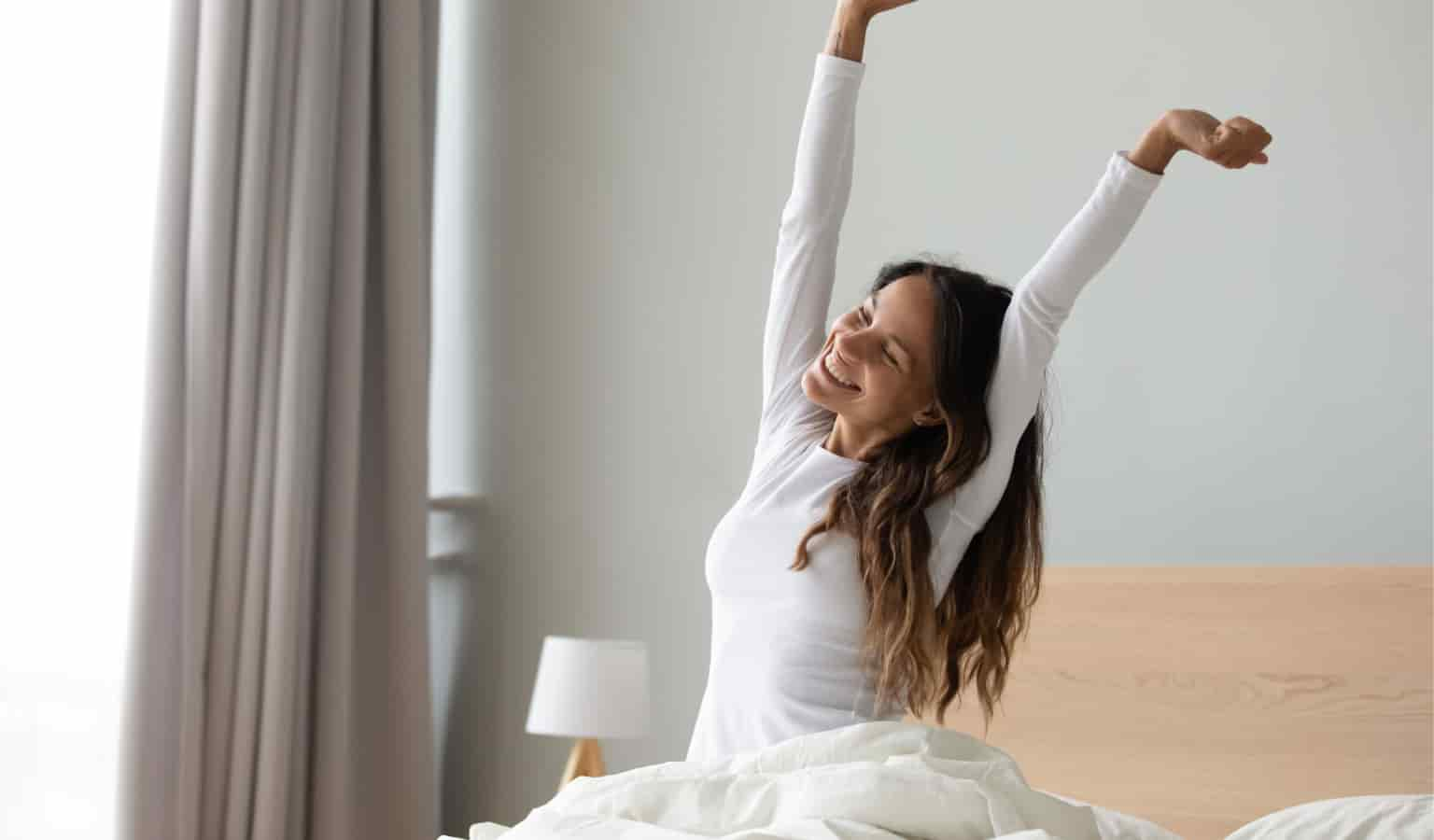
Sleep hygiene is a set of rules that everyone can put into practice and enjoy a good night's sleep.
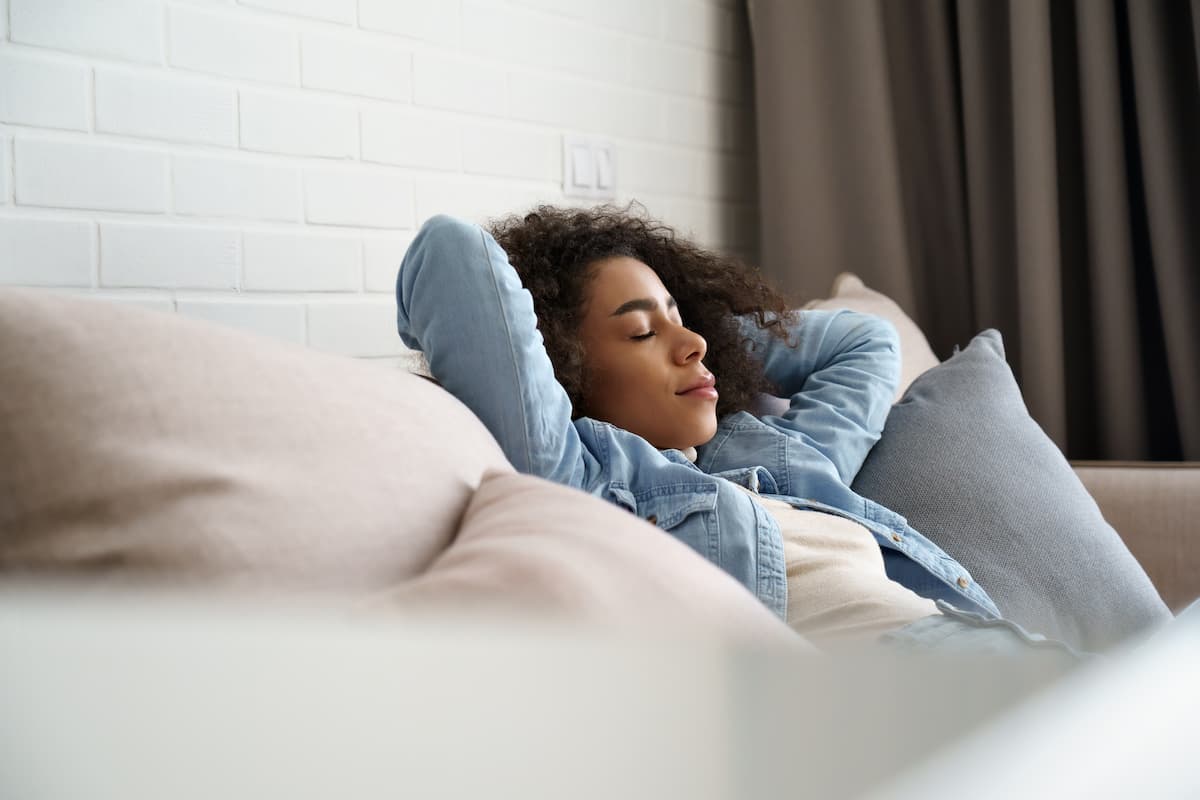
Reaching for over-the-counter tranquilliser tablets? Do it consciously.

